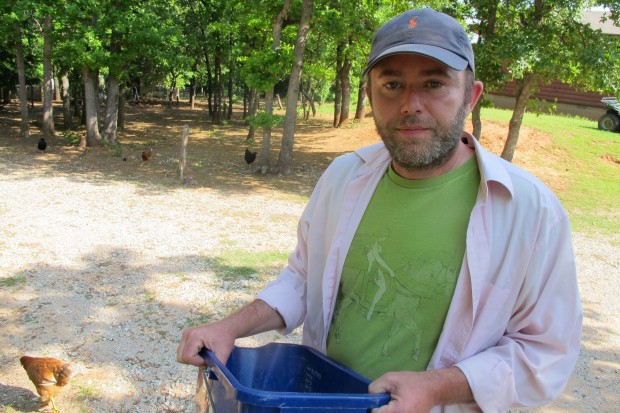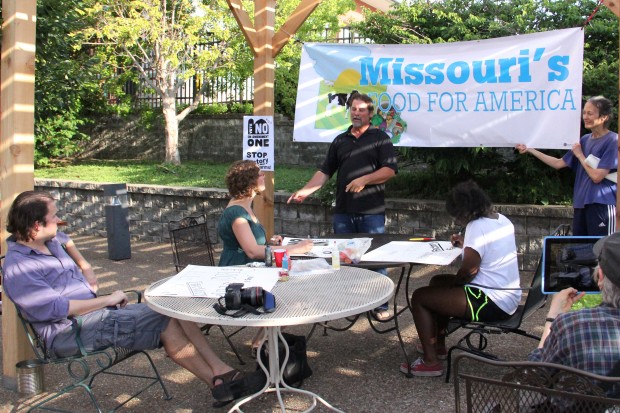
Dustin Green, owner of 10 Acre Woods farm near Norman, feeds a few of his 400 or so chickens.
Logan Layden / StateImpact Oklahoma


Dustin Green, owner of 10 Acre Woods farm near Norman, feeds a few of his 400 or so chickens.
Logan Layden / StateImpact Oklahoma

Logan Layden / StateImpact Oklahoma
Dustin Green, owner of 10 Acre Woods farm near Norman, feeds a few of his 400 or so chickens.
Oklahoma voters decide on State Question 777 in November. Supporters call the ballot initiative right-to-farm, but opponents prefer right-to-harm. It’s a divisive, national issue that’s made its way to Oklahoma, pitting agriculture against environmentalists and animal rights activists.
By now, many Oklahomans have seen the signs and billboards for and against State Question 777, and organizations backing both sides of the issue are gearing up a television ad blitz. November is months away, and the fight over whether to change the state constitution to give broad protection to the ag industry is already getting nasty.
SQ 777 is a fight between two national adversaries that loathe each other, and Oklahoma is the latest battleground. Voters in Missouri and North Dakota already passed similar right-to-farm measures.
There are two main players.
Backing the ‘no’ side, the Humane Society of the U.S. The national group pushes against confined animal feeding operations that pack poultry and livestock in small cages, and for tighter restrictions on the use of GMO crops.
Backing the ‘yes’ side, Farm Bureaus, pro-agricultural organizations that say the Humane Society wants to destroy the farm way of life.
“Why is Human Society worried about agriculture?” John Collison with the Oklahoma Farm Bureau wonders. “We’re the ones that raise millions and millions of animals every single day, and take care of them. They’re our livelihood. We’re not going to treat our business badly.”
Cynthia Armstrong, with the Oklahoma branch of the Humane Society of the U.S., says Farm Bureaus are doing the bidding of corporate agriculture and large corporations that don’t want any restrictions by supporting SQ 777.

KOMUnews / flickr / CC BY 2.0
Attendees listen as former Missouri state senator Wes Shoemeyer speaks against Amendment 1 at Café Berlin Friday, June 27, 2014 in Columbia, Missouri. The right-to-farm fight in Missouri came down to a recount.
“They want to do business the way they want to do it, without regard to environmental concerns, animal welfare,” Armstrong says. “They don’t want any of that getting in their way.”
If voters approve Right-To-Farm in November, the Oklahoma Constitution will be amended to read like this:
The Legislature shall pass no law which abridges the right of citizens and lawful residents of Oklahoma to employ agricultural technology and livestock production and ranching practices without a compelling state interest.
The wording is broad, and takes power away from the Legislature. State Rep. Donnie Condit, D-McAlester, was the only ‘no’ vote when the bill was in House committee in 2015. He voted down the measure because of emails from constituents telling him to vote ‘no’, but he later voted in favor. His rationale: Give Oklahoma voters the chance to decide.
“Forever’s a long time. Ten, 15 years from now, if we vote this in and the Legislature comes up with a crisis with agriculture, their hands are tied,” Condit told StateImpact in February 2015.
Complicating matters, Oklahoma already has a similar law on the books. It outlaws so-called nuisance lawsuits against farmers and ranchers from nearby residents who might be disturbed by noise, odors, and pollution. From a technical and political standpoint, statutes are a lot easier to change than the state constitution, and SQ 777 opponents say approving the measure will result in costly court challenges over any new laws over agriculture.
Right-to-farm supporter Travis Schnaithman’s family has a 5,000-acre farm near Garber in north-central Oklahoma. It’s a large-scale farm, but it’s still a family farm. California has already enacted some laws that he says would hurt his operation if they were in effect in Oklahoma.
“Basically, they put rules and regulations on how animals are housed. They’ve got to be in enriched crates, enriched pens,” Schnaithman says. “What it’s done is decrease that production. Those farmers out there can’t compete on a national scale with other states that don’t have those rules and regulations.”
Many of the smaller, organic farmers StateImpact has interviewed over the past year are urging voters to vote no on SQ 777, like Dustin Green, who owns a 10-acre farm outside of Norman.
“I have no affiliation with Human Society at all, but it’s important to have organizations like them who hold us accountable, that say ‘this isn’t good for the animal. It’s unsanitary. It spreads bacteria. It spreads diseases,’ Green says. “They shouldn’t be locked in cages. They shouldn’t be locked in barns”
StateImpact has interviewed about a dozen farmers on SQ 777 and there seems to be a trend: The bigger your farm, the more likely you’re a right-to-farm supporter.